These briefs make the case for applying a nurturing care lens when addressing specific issues affecting children’s development. They outline what is already happening and what can be done better or differently at multiple levels (policy to community) to ensure families receive the support they need and children receive nurturing care.
 Nurturing care for children with developmental delays and disabilities
Nurturing care for children with developmental delays and disabilities
COMING SOON! This brief outlines why and how nurturing care is relevant for these children and recommends a set of actions to strengthen policies, services, communities and caregiver capabilities so that these children receive nurturing care.
Coming soon: Arabic, French, English, Spanish
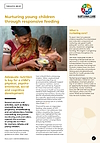 Nurturing young children through responsive feeding
Nurturing young children through responsive feeding
Responsive feeding both relies on and supports the integration of all five components of nurturing care into the feeding process. This brief explains what is meant by responsive feeding and how to create the enabling environments for caregivers to responsively feed their young children.
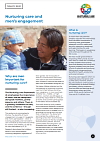 Nurturing care and men’s engagement
Nurturing care and men’s engagement
This brief summarizes the evidence regarding the benefits of men’s engagement on outcomes for women, children, and even men themselves. It consolidates the learnings thus far regarding designing and adapting services to engage men in providing nurturing care. Finally, it recommends practical actions for policymakers and programme designers across four enabling environments: policies, services, communities and caregivers – all illustrated with case studies. It focuses particularly on what health services can do, while also covering education, social protection and other sectors.
 Nurturing care for every newborn
Nurturing care for every newborn
This brief summarizes why nurturing care is essential for all newborns and uses the five components of nurturing care to describe what every newborn needs to survive and thrive. The brief includes practical examples of creating nurturing environments for newborns, including those who are born to soon, small or sick, in India, Sweden, The Philippines, Colombia and Lebanon.
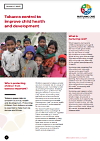 Tobacco control for child health and development
Tobacco control for child health and development
Enabling children to grow up free from the dangers of tobacco exposure is a key aspect of providing clean, safe and secure environments. This thematic brief presents how comprehensive smoke-free policies positively impact child health and development and calls for the strengthening of tobacco control globally.
Chinese version; French version; Spanish version
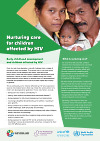 Nurturing care for children affected by HIV
Nurturing care for children affected by HIV
This brief makes the case that ensuring children affected by HIV survive and thrive requires applying a nurturing care lens to routine maternal, newborn and child health services, as well as, HIV prevention and care services. This brief outlines what is already happening and what can be strengthened or added to maximize the available opportunities within existing health services to change the life trajectory of young children affected by HIV for the better.
Spanish version
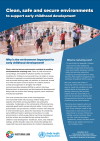 Clean, safe and secure environments
Clean, safe and secure environments
This brief summarizes some of the most important environmental health risks faced by children today and explains why infants and young children are particularly vulnerable. It aims to alert policymakers and practitioners, whether involved with childcare or environmental issues, about the importance of considering early childhood needs in policies and practices, to create environments in which young children can thrive.
Spanish version
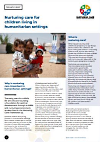 Nurturing care for children living in humanitarian settings
Nurturing care for children living in humanitarian settings
This thematic brief sheds light on the need to better ensure children in humanitarian settings receive nurturing care. The brief summarizes what programme planners and implementers can do to minimize the impact that emergencies have on the lives of young children and their families.
WHO news release; IRC news release; Arabic version; Spanish version




